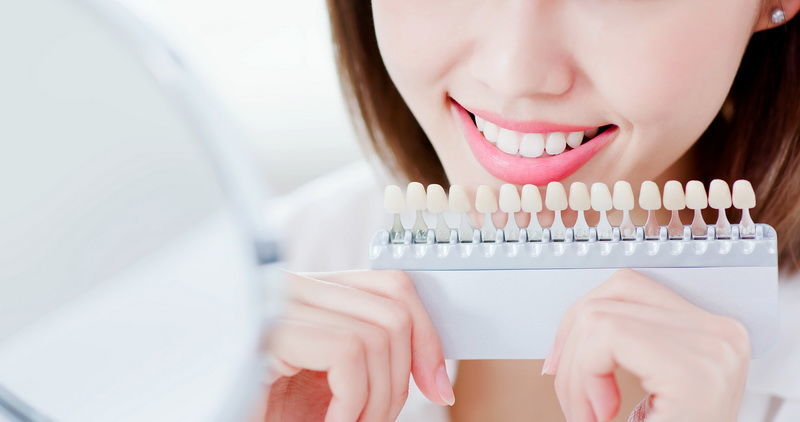Q&A on Teeth Whitening
Why are my teeth yellow?
Teeth can be discoloured for a number of various reasons:
- Normal part of ageing. As we get older, the middle part of our tooth (dentine), gets darker and so our teeth in turn become darker. This is where professional whitening treatments by your dentist can really help. Know that no amount of scrubbing, charcoal toothpaste or internet-bought lighting up mouthpiece can lighten the colour of your dentine!
- Staining and discolouration of the outer layer of your tooth (enamel) from food and drink.
- Developmental anomalies in the structure of enamel/dentine due to genetics, environment or unknown causes. There are a variety of treatment options to assist with improving the appearance of these teeth which our dentists can discuss based on your individual circumstances.
What is whitening?
Whitening your teeth is a dental procedure which should be performed by a qualified health professional like your dentist. Our products are all TGA approved and contain safe amounts of either hydrogen peroxide or carbamide peroxide (the main active bleaching agents which work to whiten your teeth).
Options for whitening:
1. Whitening toothpaste - these contain only a mild concentration of peroxide plus abrasive agents to help remove stains.
Pro: Cheap and convenient, good for light surface staining
Cons: Only good for light surface staining, long term use of abrasive agents can damage enamel and gums
2. Whitening strips - these are plastic strips coated with peroxide agents.
Pro: Cheap, convenient, good for light surface staining
Con: Can give uneven results because the strips can't get into the 'nooks and crannies' of your teeth as they are not customised to the shape of your teeth
3. Take home whitening - this process involves 2 short appointments. One appointment to take moulds of your teeth to make custom fitted flexible trays which hold the whitening gel in place firmly around your teeth. The concentrate of the gel is safe enough for you to use at home - our dentists spend time at the second appointment providing you with instructions on how to use the kit at home.
Pro: If used as directed results are great, generally pain free and can be maintained long term with "top up" gels.
Con: Need to wear the trays for one hour a day over a two week period to get the best results,
4. In chair whitening - this is done in the chair with your dentist and takes approximately 90 minutes. Our dentists use protective barriers for your gums and lips as the bleaching agents are highly concentrated and should only be used in the hands of a dentist. We recommend combining this option with take home whitening kits so you can maintain the results long term.
Pro: Fast and immediate results (great for special events such as weddings)
Con: Can be uncomfortable in the chair, temporary sensitivity, expensive
Why do I have to see a dentist to whiten my teeth professionally
It is always best to see a dentist before you start whitening your teeth. This is so that the dentist can assess your teeth and gums to check if 1) whitening is the best option for your individual needs, 2) all necessary preliminary work is completed to help ensure whitening results are successful. For example:
- If you have undiagnosed dental decay, the bleaching agents can cause extreme pain and sensitivity in these teeth.
- If you bleach your teeth whilst you have active gum disease, it can make your condition worse and cause pain
- If you have existing fillings, crowns, implants, veneers these cannot be whitened and so its best to see a dentist who can best manage your whitening plan accordingly to achieve the results you are after.
All whitening procedures carry risks, our dentists will discuss all risks prior to commencing any treatment.
Our dentists here will assess whether you are suitable for whitening. Teeth whitening can cause burns, allergic reactions, sensitivity/pain if not done correctly and under the care of a dentist. As mentioned earlier, if you have pre-existing decay, gum disease or fillings/crowns/implants, then teeth whitening can make your condition worse so it's always best to have the guidance of a health professional when dealing with your teeth.
Which option is best for me?
This decision is completely up to you! Our dentists can help guide you and discuss all the options in depth with you to suit your individual needs.
Will whitening damage my teeth?
If used correctly, for the right candidates and under instruction of a dentist, then whitening is safe and will not damage your teeth or gums.
Long term, extensive or incorrect use of any whitening product without prior discussion with your dentist can damage your teeth or gums. So, it is always best to speak to our dentists first after your check up to know what's best for you.
What about charcoal toothpastes?
There is not a lot of evidence in favour of toothpastes containing activated charcoal. The limited evidence available does suggest that it may be effective at whitening teeth and reducing stains. However, similar to whitening toothpastes it is abrasive and should only be used for short periods. The charcoal can also get lodged in cracks of teeth or edges of fillings, leaving unattractive stains behind! It is not recommended to make your own charcoal toothpaste as it can be far too abrasive and damage your enamel.

